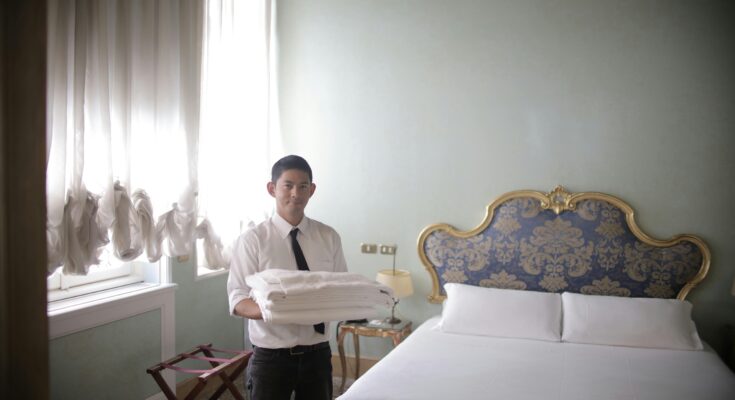Italy is a top travel destination, attracting millions of tourists each year with its breathtaking landscapes, rich culture, historical landmarks, and world-famous cuisine. With the booming tourism industry comes a high demand for hotel workers in cities like Rome, Venice, Florence, and Milan, as well as coastal and countryside resort areas.
If you’re an international job seeker looking to work in the hospitality sector, hotel jobs in Italy offer exciting opportunities to build a rewarding career while enjoying the Italian lifestyle. In this guide, you’ll learn everything you need to know about applying for hotel jobs, visa requirements, salaries, and tips for success.
Work Permits and Visas for Hotel Jobs in Italy
Types of Work Visas for Hotel Employees
If you’re a non-EU citizen, you’ll need a valid work visa to legally work in Italy. The most common visa types for hospitality roles include:
-
Subordinate Work Visa (Lavoro Subordinato):
For applicants with a formal job offer from an Italian hotel or resort. -
Seasonal Work Visa (Lavoro Stagionale):
Perfect for temporary or peak-season roles, such as during the summer or holidays. -
EU Blue Card (for Managerial or Specialized Roles):
Used rarely in hotel jobs, but applicable to high-level positions such as hotel directors or HR managers.
Visa Process Overview
-
Step 1: Get a Job Offer from a licensed hotel or employer in Italy.
-
Step 2: Employer Applies for Authorization (Nulla Osta) from Italian immigration.
-
Step 3: Apply for a Work Visa at the nearest Italian embassy or consulate.
-
Step 4: Travel to Italy and Apply for Residence Permit (Permesso di Soggiorno) within 8 days of arrival.
Important Tips
-
Have your documents translated into Italian.
-
Keep copies of your employment contract.
-
Apply early to avoid seasonal processing delays.
Types of Hotel Jobs Available in Italy
The Italian hospitality industry offers a wide range of job roles for international applicants—from entry-level positions to senior management.
1. Front Desk Receptionist (Receptionist)
-
Greeting guests and handling check-ins/check-outs
-
Answering calls and emails
-
Managing reservations and room assignments
2. Housekeeping Staff (Cameriera ai Piani)
-
Cleaning and preparing guest rooms
-
Replenishing supplies and toiletries
-
Ensuring hotel hygiene standards are met
3. Waiter/Waitress (Cameriere/a)
-
Serving food and beverages in hotel restaurants
-
Taking orders and delivering meals
-
Assisting with room service
4. Concierge (Portiere di Notte / Concierge)
-
Assisting guests with information and local services
-
Making restaurant or tour bookings
-
Handling special guest requests
5. Chef / Kitchen Assistant (Cuoco / Aiuto Cuoco)
-
Preparing meals in hotel kitchens
-
Supporting head chefs and managing food prep
-
Ensuring food safety and hygiene
6. Hotel Manager / Assistant Manager
-
Overseeing daily hotel operations
-
Managing staff and guest satisfaction
-
Budget planning and business development
7. Maintenance Technician
-
Repairing appliances and hotel systems
-
Performing regular facility inspections
-
Handling electrical, plumbing, or mechanical issues
Top Locations for Hotel Jobs in Italy
-
Rome & Florence: Historical tourism hotspots with year-round hotel employment.
-
Venice: High demand during tourist seasons.
-
Milan: Known for business travelers and luxury hotels.
-
Amalfi Coast, Sicily, Sardinia: Ideal for seasonal resort jobs.
-
Lake Como & Tuscany: Scenic regions with upscale hotel chains.
How to Find Hotel Jobs in Italy
Online Job Platforms
Start your job search with popular websites such as:
-
Indeed Italia
-
Jobrapido
-
Monster.it
-
LinkedIn
-
Glassdoor
-
Turijobs
-
EURES (European Job Portal)
Hospitality Recruitment Agencies
Trusted staffing firms that specialize in hospitality include:
-
Adecco
-
Randstad
-
Gi Group
-
Manpower Hospitality
Direct Hotel Applications
Many well-known hotel chains in Italy accept direct applications:
-
Hilton Hotels Italy
-
Marriott International
-
NH Hotels
-
Starhotels
-
B&B Hotels
-
Boutique and family-run hotels
Networking and Referrals
-
Join hospitality groups on Facebook or LinkedIn.
-
Attend tourism and hotel career fairs.
-
Reach out to current hotel employees or interns for referrals.
CV and Cover Letter Tips for Hotel Jobs
CV Writing
-
Use a clear and professional format.
-
Include a professional photo (commonly used in Italy).
-
Highlight customer service skills and language abilities.
-
Mention any previous hotel, restaurant, or tourism experience.
Cover Letter Writing
-
Keep it short, polite, and to the point.
-
Customize it for each hotel or position.
-
Mention your willingness to relocate and your work visa status.
-
Show enthusiasm for Italian culture and hospitality.
Interview Preparation
Common Questions
-
Why do you want to work in the hospitality industry?
-
How do you handle difficult guests or complaints?
-
Are you available for weekend or night shifts?
-
Can you work under pressure during peak seasons?
-
How many languages do you speak?
Professional Etiquette
-
Be punctual and dress neatly.
-
Greet the interviewer with a smile and formal tone.
-
Bring printed copies of your CV and references.
Average Salaries for Hotel Jobs in Italy
| Position | Average Annual Salary (EUR) |
|---|---|
| Receptionist | €18,000 – €25,000 |
| Housekeeping Staff | €15,000 – €20,000 |
| Waiter/Waitress | €16,000 – €22,000 |
| Concierge | €20,000 – €30,000 |
| Chef / Cook | €22,000 – €40,000 |
| Hotel Manager | €35,000 – €60,000 |
Salaries vary depending on the city, hotel rating, experience level, and position.
Cost of Living for Hotel Workers
Major Monthly Expenses
-
Rent: €500 – €1,000 (depends on city)
-
Utilities & Internet: €100 – €200
-
Groceries & Food: €200 – €350
-
Transport: €30 – €60
-
Mobile Plans: €10 – €25
Smaller towns and rural areas are more affordable than major cities.
Work Culture and Environment
Work Hours
-
Hotel jobs may require flexible hours, including evenings and weekends.
-
Full-time schedules typically range from 35–40 hours/week.
-
Overtime is common during busy seasons.
Dress Code & Etiquette
-
Most hotels have formal or uniform dress codes.
-
Excellent grooming and polite behavior are essential.
-
Italian hospitality values friendliness and respect.
Language Requirements
-
Basic Italian is usually required for customer-facing roles.
-
English is often a plus in tourist-heavy areas.
-
Multilingual candidates (especially French, German, Russian, or Chinese) have a competitive edge.
Frequently Asked Questions
Can foreigners work in Italian hotels?
Yes. With a valid work visa, many hotels welcome foreign employees, especially in tourism-focused regions.
Are seasonal hotel jobs available?
Yes, especially during summer (June to September) and holiday seasons (December to January).
Is it necessary to know Italian?
Basic Italian is strongly recommended. However, English may be enough for some roles in international or tourist-heavy hotels.
How can I increase my chances of getting hired?
-
Get a hospitality certification (like from a culinary or hotel management school).
-
Learn Italian and customer service etiquette.
-
Apply early for seasonal roles.
Conclusion
Hotel jobs in Italy are an excellent way for foreigners to gain international work experience, earn a steady income, and immerse themselves in the Italian way of life. Whether you’re interested in front desk work, culinary arts, housekeeping, or hotel management, there are opportunities across the country waiting for you.
By preparing a professional CV, learning the language basics, understanding the visa process, and applying strategically, you can take the first step toward a fulfilling job in Italy’s dynamic hospitality industry.



